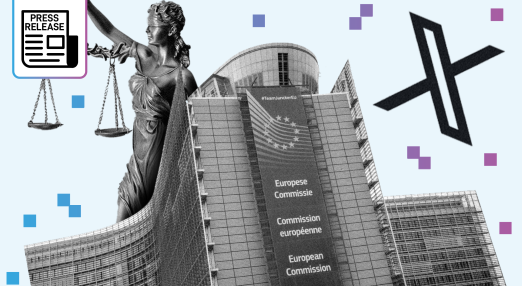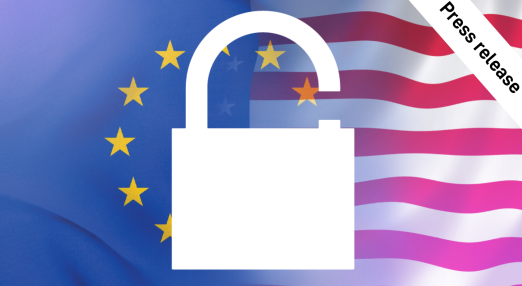Press releases
Filter resources
-

Press Release: EDRi calls for swift action as EU probes X’s Grok over AI-generated harm
The European Commission has opened a DSA investigation into Grok, X’s AI chatbot. EDRi welcomes this decision and is calling for a swift resolution to this matter, to ensure that X complies fully with its DSA obligations and protects its users.
Read more
-

Press Release: EU stands up to Big Tech with €120 million fine to X
The European Commission took aim at X for breaking the DSA, proof that Europe’s landmark law can bite. Despite political pressure and corporate pushback, the EU is showing that online platforms can and will be held accountable for practices that mislead users, cause harm, or undermine democracy.
Read more
-

Press Release: Commission’s Digital Omnibus is a major rollback of EU digital protections
Today the European Commission has published two Digital Omnibus proposals, reopening the EU’s core protections against harm in the digital age. This step risks dismantling the rules-based system that was hard-won over decades, endangering the very foundation of human rights and tech policy in the EU.
Read more
-

Press Release: Brussels rocked by major spyware scandal: Urgent call for ban
Now, when push has come to shove, policymakers at the European Union (EU) must act to ban spyware in Europe. Yesterday, the media reported a major attack on EU democracy with members of the European Parliament Defense Committee being the target of phone hacking.
Read more
-

EU AI Act: Deal reached, but too soon to celebrate
On 8 December 2023, following over 36 hours of negotiations, EU lawmakers finally cinched a deal on the Artificial Intelligence Act. However, whilst some fundamental rights protections have been won, the overall Act has not lived up to its potential to put people and their rights front and center.
Read more
-

A coalition of six organisations takes EU’s dangerous terrorist content regulation to court
On 8 November 2023, a coalition of six organisations filed a complaint before the French supreme administrative court, the Conseil d’État, against the French decree implementing the Regulation on addressing the dissemination of terrorist content online.
Read more
-

Press Release (CSA Regulation): Who benefits from the EU Commission’s mass surveillance law?
A newly-published independent investigation uncovered that the European Commission has been promoting industry interests in its proposed law to regulate the spread of child sexual abuse material online.
Read more
-

Press Release: The EU’s Internal Market Committee votes for protecting encryption in the CSA Regulation
The European Union’s Internal Market and Consumer Protection (IMCO) Committee becomes the fourth European Parliament Committee to adopt an opinion on the European Union Child Sexual Abuse (CSA) Regulation, voting to protect encryption and rule out unacceptably risky technologies.
Read more
-

EU Parliament calls for ban of public facial recognition, but leaves human rights gaps in final position on AI Act
The final EU Parliament position upholds all of the fundamental rights demands which were added at committee level. Despite efforts to overturn it, the final position also maintains the committees' strong stance against biometric mass surveillance practices. But it is disappointing that the plenary missed the opportunity to increase protections when it comes to empowering people affected by the use of AI and the rights of migrants, refugees and asylum seekers.
Read more
-

EU Parliament sends a global message to protect human rights from AI
Today, the Internal Market Committee (IMCO) and the Civil Liberties Committee (LIBE) committees took several important steps to make this landmark legislation more people-focused by banning AI systems used for biometric surveillance, emotion recognition and predictive policing. Disappointingly, the MEPs stopped short of protecting the rights of migrants.
Read more
-

EU-US plan offensive to legitimise police access to data, civil society responds amid growing fears – Press Release
On 6 April 2023, EDRi and 8 partners sent an open letter to the European Commission President Ursula von der Leyen and Vice President Margrethe Vestager, as well Swedish Prime Minister Ulf Kristersson. Through the letter, the organisations called out the clear and deliberate plans to disregard international human rights standards in the EU-US approaches to security in the digitalised society, in particular in regards to end-to-end-encryption.
Read more
-

Poll: Young people in 13 EU countries refuse surveillance of online communication – Press Release
According to the results of the survey, 80% of young people aged 13 to 17 years old from 13 EU Member States would not feel comfortable being politically active or exploring their sexuality if authorities were able to monitor their digital communication, in order to look for child sexual abuse.
Read more
